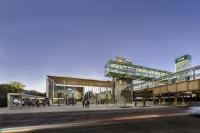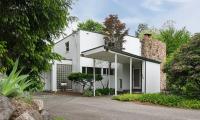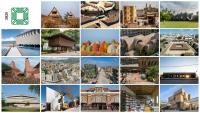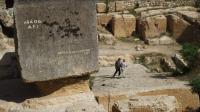Westminster Academy at the Naim Dangoor Centre
London, Great Britain
The Westminster Academy is a new secondary school in West London, housing 1175 pupils and 128 staff members. The sponsor, Exilarch Foundation and the founding principal had a powerful vision of learning for the school that embraces the latest thinking in education and the ideals of the RSA Curriculum of the 21st century. The core values of the Academy are Enterprise, Global Citizenship and Communication delivered through a flexible and responsive learning framework that gives pupils individual responsibility for their education and encourages team working by both staff and pupils.
In response to this clear and progressive brief, Allford Hall Monaghan Morris have created a building that draws upon the extensive and varied experience of their practice in a range of sectors. The driving idea was to create a learning environment that inspired creativity and enabled connectivity and flexibility. This approach seeks to create a completely different learning environment – one that raises expectations in terms of what this might mean in the 21st century.
Civic Pride
The Academy is located in a gritty urban context, dominated by the Westway flyover, surrounding 1960s tower blocks and the Harrow Road. The site is also crossed by a public right of way and houses several public sports pitches. The physical complexities of the site are matched by the cultural and social challenges of working in one of the poorest areas in the capital with a secondary school population of whom a high proportion are bilingual.
The school is located along one edge of the site lining the Harrow Road in the form of a five-storey building housing all facilities except the sports facilities. These are housed in a separate building to allow for all year round community use.
In response to the powerful sculptural nature of the surrounding architecture and civil engineering and the need for a fully sealed building, the Academy façade is boldly stratified into large panels of glazing, vibrantly coloured terracotta tiles in green and yellow and a series of illuminated screens. These layers, relating to the functions inside, create a highly-reflective building by day that transforms into a colourfully glowing beacon at night.
The rear elevation to the south continues this stratification with deep cantilevered balconies overlooking the terraced outdoor spaces. These balconies act as the primary means of escape for the classrooms and therefore allowing the central atrium to be totally open.
Sustainability
Sustainability was a core theme of the project approached through the design of all elements and the selection of materials and services. Within the glazed atrium, which provides significant amounts of natural light within the building, the system for shading has been designed as a sculptural feature running north/south. The system of baffles, coloured green and yellow in one direction and painted white on the reverse to maximise reflected light provide effective shading but are made from simple door blanks.
Due to the requirement to keep out noise from the Westway and Harrow Road the building is sealed and so mechanically ventilated, which provides greater flexibility in use to spaces internally.
The in-situ, exposed concrete frame, projecting balconies on the rear elevation and the sedum roof are all sustainable features that have been designed to add drama to the school whilst delivering a range of environmental advantages – now and during the life of the building.









